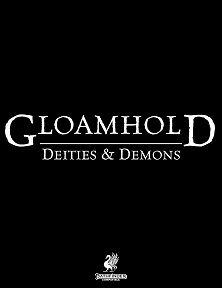
The Foreword describes how this book has been quite a while in the making, with some of the earliest deities having been invented for the author's first-published adventures, and now being brought together with all the other ones which have popped up over the years, along with wholly-new ones including those venerated in the main by non-human species. Whilst each deity is quite richly-detailed, their spheres of influence have been left quite general to facilitate a pick and mix approach by those GMs who have their own deities - use what you want and discard the rest. It's not a rigid pantheon where you have to use all of it or nothing at all.
We start off with major human powers. Each deity is listed with alignment and areas of influence, before the text goes into more detail covering symbols, clerical attire, holy texts, a summary of their teachings and so on. There are six of them. The holy symbol of each is illustrated, although The Mother appears to have the symbol of another deity called Conn rather than what the text describes for Her. These are followed by a whole slew of minor deities, who are treated in the same way. It's not really quite clear what distinguishes a major deity from a minor one, perhaps it is the breadth of their interests: the minors seem more focussed.
We then move on to non-human deities with pantheons for dwarves, elves, gnomes, halflings and orcs. These are only treated in summary, none of the detail lavished on the human powers. This is in part due to the Gloomhold Campaign, for which these are intended, being fairly human-centric. The temples and clerics you are likely to encounter are more likely to be those of the human deities.
This also begs the question: is ancestry (or species) more important that what a deity stands for? How do people choose which deity they wish to revere? Or do they drop in on whoever is appropriate for what is concerning them at the moment? Beyond the scope of this book, perhaps, but things worth considering for the role-playing aspects of worship as a part of everyday life in your campaign world.
But I'm rambling. This work ends with a summary table to help you select the right deity for your needs. The human powers have been well-developed, it would be nice to see a more thorough treatment of the non-human ones...
Return to Deities and Demons page.
Reviewed: 9 September 2019

